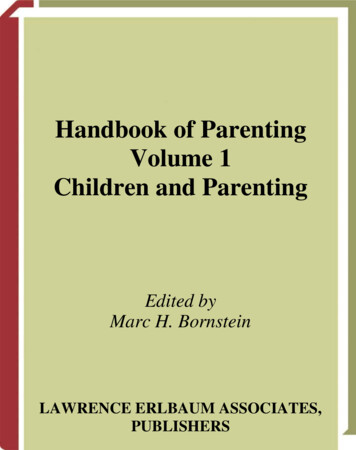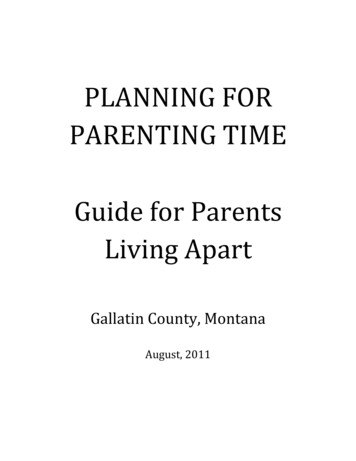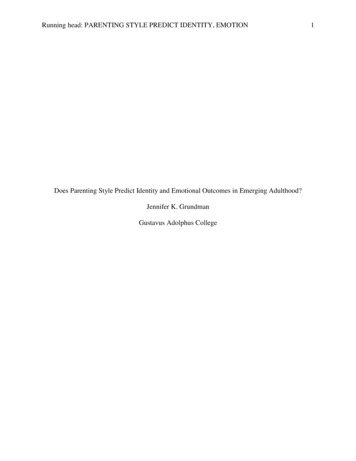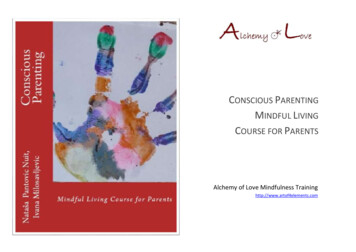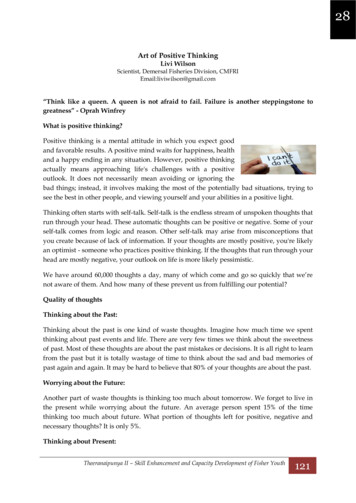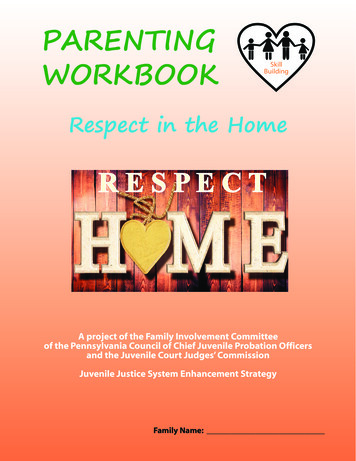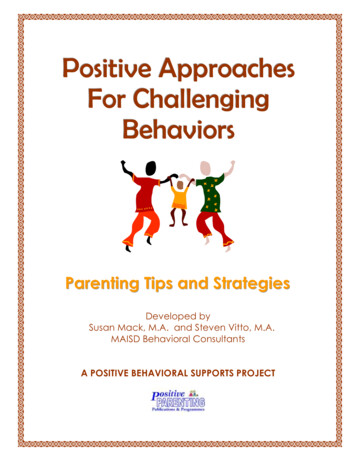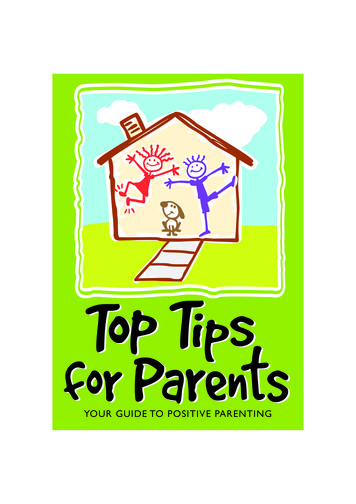
Transcription
YOUR GUIDE TO POSITIVE PARENTING
IntroductionChanges To The LawIn September 2006, the law on physical punishment was changed. If aparent harms his/her child through physical punishment, the defenceof reasonable chastisement will now only be considered if the harm isseen as minor.Everyone accepts that children must learn right from wrong anddevelop the ability to get on with others. However, it is important toremember that you do not have a right to physically punish your childand you should, therefore, consider other methods such as positiveparenting.Being a parent is a wonderful thing; however, it’s not always easy.Hopefully, the information in this booklet will show you how you canuse techniques to guide, nurture and encourage your child and buildyour confidence as a parent.We want our children to behave well, and to: have respect for themselves and others;be polite to others;know how to behave in different situations;be able to concentrate and pay attention;share and to take turns;know how to win and how to lose.But children often behave quite differently, and we may feel annoyed,frustrated and embarrassed.This booklet suggests a few ideas to help you with your child’sbehaviour.Parents of teenage children or children with a disability may faceadditional challenges and pressures, which are not addressed withinthis booklet. However, there are details of organisations that may beable to help in the contacts section at the back of this booklet.page1
ContentsUsual Behaviour4What Makes Children BehaveIn Challenging Ways?4Coping Under Pressure5Tips for Helping WithChildren’s Behaviour6Tip 1: Talk and Listen6Tip 2: Play8Tip 3: Understanding ChangesAs They Grow9Tip 4: Set Boundaries10Tip 5: Reward and Notice Good Behaviour11Tip 6: Build Self Confidence12Tip 7: Have Realistic Expectations andAllow Consequences13Tip 8: Deal With Meltdown Moments Positively13Tip 9: Look After Yourself16Tip 10: When Things Are Getting Difficult17Useful Contacts18Comments23page3
Top Tips for ParentsUsual BehaviourChildren may: page4have tantrums;shout and scream;hit siblings, parents, friends;not do as they’re told;break things, spill things, squash things;not listen or concentrate.This is not unusual. Children are learning what happens when theyhave a tantrum, hit another child, say rude words.Children will always push against boundaries.They are checking outwhat their parents will draw the line at, what they can and can’t do.This helps them understand what is acceptable and what isn’t.Parents work out their own ways of looking after their children.Thereis no simple recipe; it takes time for children to learn how to behave,and for parents to work out the best way of getting the best out oftheir child.What makes children behave in challenging ways?Children do not usually misbehave just to upset or annoy theirparents.There is often a reason behind a child’s behaviour.It may be: theytheytheytheyare upset or anxious about school;feel jealous of their brother or sister;want their parent to listen to them;want their parent to spend time with them.Behaviour patterns can get stuck. At some point most children willmisbehave to get attention. If a parent doesn’t pay much attention
when children are behaving well, some children will try ‘acting up’ toget attention, even if it results in a telling off.Coping Under PressureCoping with your child’s misbehaviour can be stressful. Sometimes itcan seem like you’re about to reach boiling point.Parents need tofind ways toreduce thepressure in thehome and can doa lot to help theirchild’s behaviourthrough positiveparenting.In fact, parents canmake thedifferencebetween theirchild’s behaviourgetting out ofcontrol, andhelping themmanage everydaylife in better ways.page5
Tips for Helping With children’s BehaviourTip 1: Talk and ListenAs we know, all children are unique.Getting to know your own child, and knowing what makes themangry or agitated can help you prevent angry or upsetting situationsbefore they happen.Talking and listening to your child helps them to understand what’sgoing on: page6 Language:Try to use positive words.Tell yourchild what you want them to do, not what youdon’t want them to do. Instead of “don’t makesuch a mess” try “tidy up your toys please”. This isan example of positive parenting.Change your tone: Your voice is a powerful tool.Sometimes changing your tone or volume can beenough to stop afraught situation orget your child to dowhat you want. Thiscan work equallywell with olderchildren. If you reactor speak in acompletely differentmanner to whichthey expected theymight be surprised.
Listening: Feelings: Help them find theYour child istrying out his/her newlanguage and needs to beheard. Encourage your childto talk to you – sit besidehim/her – they’ll find it easierto talk and listen to you ifyou’re not standing overthem.words to tell you how theyare feeling, even if it takestime. Explaining:If you have tosay ‘no’, give your child agood reason and offer analternative – “Rosie is playingwith the doll now, let’s find youanother toy”. Involve your child: Discussion: As they get older discuss the setting of rules withWherepossible talk with them about the rules and what you expectfrom them. Be clear.them.Tell them you love them, and show them by smiling, cuddling andkissing them.Tell them when you are cross, or when you are nothappy with their behaviour.They need to realise that it’s the behaviouryou don’t like and not them.page7
Tips for Helping With children’s BehaviourTip 2: PlayIf children are playing, they are less likely to be posting the remote controlin the bin or wrestling with a brother or sister! If you’ve got a lot to doin a short space of time, set up an activity that will give you that allimportant extra half an hour.Play is important and enjoyable, and children can learn a lot from it.Children need time to play on their own, with others and with theirparents, as long as they play safely.A few ideas for play might be:page8 Painting, drawing and colouring: Children enjoy creatingworks of art and the messier the better! Water: A washing up bowl of water and a couple of cups ora plastic jug can keep a toddler busy for ages. Imagination: Get out some teddies and dolls and createa tea party, a zoo made up of all sizes and shapes oftoys or arrange a ‘shop’, with some of the(unbreakable) contents of your kitchen cupboards –let their imagination run wild. Keep it simple: Try to keep abox of toys, crayons and playdough handy and make the mostof bath time for playing with acouple of cups and a sponge. Join in: Once you’ve goteverything out of the way,take five minutes to getinto what your child isdoing – show them thatwhat they’re doing isimportant.
Tip 3: Understand Changes As They GrowChildren’s needs and understanding change as they grow, and whatmight be expected of a four-year-old can’t be expected of a two-yearold: Exploring: Young children find out abouttheir world by touching, shaking, tasting,pouring, squeezing the list is endless! Thisisn’t naughtiness, but a way of learningabout their world. Make your home‘toddler proof ’ by storing valuables andbreakables away from your child so theycan explore safely. The mess of life with atoddler can be exhausting but think of allthe learning they’re doing!Independence: Part of growingup for your child will be pushingagainst the boundaries andbecoming an individual. You canhelp them by letting them do asmuch for themselves as possible– for young children, keep toys ata child’s height, let them dressand feed themselves. Encouragement:Your child will learn what’s ok to do from you,so give lots of praise and attention to good behaviour. If you onlypay attention to your child when they misbehave, they’ll learn tomisbehave to get your attention.page9
Tips for Helping With children’s BehaviourTip 4: Set BoundariesChildren need clear rules, boundaries and routine. page10 Be consistent.Parents need to agree the rules. It will help the child if bothparents take the same approach.When you say no, mean no. Keeping to this can be hard work,but if you have a few clear rules, it helps you and your children.If you make promises keep them.Rules should be simple and clear.Keep to as few rules as possible.Try one new routine at a time and get it working before movingon to the next.
Tip 5: Reward and Notice Good BehaviourSometimes it is easy to ignoreyour child when they arebehaving well, and only noticethem when they are misbehaving.Children love their parents’attention, and if they have tobehave badly to get it, they will.Give them lots of praise whenthey are behaving well, ratherthan focussing on misbehaviour. Rewards do not have to bematerial things.Real praise andencouragement is the bestreward as it can boost achild and build self-esteemand confidence.Try not to stress over thelittle things. If you are praising things they are doing well, andignoring the small niggles, your child will learn that unacceptablebehaviour no longer gets them the attention.page11
Tips for Helping With children’s BehaviourTip 6: Build Self ConfidenceBuilding your child’s self confidence will help them to try out newthings, make friends and cope with the upsets and problems theymeet as they grow up. Finding out: Give your childthe chance to face newexperiences and challengeswith your support. page12 Love: Tell your child that youlove them; it’s great to smile,cuddle and kiss them.Independence: Don’t try tosolve every problem for yourchild – sorting it out forthemselves can be a boost totheir confidence.Praise: As a general rule, tryto give five times more praisethan criticism.Avoid comparisons: Allchildren are unique. Don’tcompare your child to otherchildren and share that withthe child, they will grow up tocompare themselvesunfavourably with others.
Tip 7: Have Realistic Expectations and Allow ConsequencesChildren are children.They will be messy, noisy and, attimes, disobedient. Give them the freedom to make mistakes.Encourage your child to think for themselves andtake responsibility for their actions.Tip 8: Deal with MeltdownMoments PositivelyThere will be difficult timesfor every family – usuallywhen there’s too much todo in a short space oftime, or when what youneed to do, clashes withwhat your child wantsto do.Recognise TriggersThere might be some specific triggers or times when your childmisbehaves. Be aware of these and try different approaches.The morning rush “I try to get clothes out and make up their packed lunches thenight before – it gives me a bit of extra time in the morning.”“Getting them to do a bit for themselves always helps, even if it’sjust getting a bowl and a spoon. They feel like they’re helping andits one less thing for me to do.”“I get up before everyone and have five minutes on my own fora quick coffee each morning.”page13
Tips for Helping With children’s BehaviourAt the supermarket checkout “I try and find something else to interest her before we get tothe checkout – sometimes I even sing just to keep her fromasking for sweets!”“When he’s sitting in the trolley I pass him things to put on thecounter and he really likes that.”“We plan something ‘nice’ to do together after the shopping, aswe shop, like watching a favourite DVD or going to the park.”page14Playtime “I put his favourite toy away when other kids come round – itsaves them fighting over it.”“If she’s really got herself upset, I try and take her somewhereelse so she can calm down – she still has to know she can’t fight,but it’s better doing that somewhere quiet.”
Early evening to bedtime “When I get in from work, I tryand have five minutes just forthem – once I’ve heard abouttheir day, it’s easier for them tolet me get on and cook tea.”“We’ve just started giving him afive minute warning so he knowsthat he’s got a bit more time toplay then it’s bedtime.”“We have a ‘bedtime routine’ ofa bath, book and then bed.”Other things you may wishto try: Distraction: For young children,try distracting their attentionaway from what you don’t wantthem to do. Time Out: One alternative to physical punishment is to put yourchild in a dull but safe place for a period of time.The child shouldbe of an age and ability to understand that they are to stay thereuntil you tell them otherwise.The time limit should be oneminute for every year of the child’s life. Withdraw privileges: For dealing with serious misbehaviour, trywithdrawing privileges, for example, favourite programmes, playingwith games, loss of pocket money, grounding etc. Be a role model: It is your responsibility to set an example foryour child, by your own behaviour and attitude.page15
Tips for Helping With children’s behaviourTip 9: Look After YourselfIf you make sure you get a break to relax, this may help you copebetter.Try to: page16 take time for yourself;keep interests outside the home;take up the offer of help from family and friends;get rest when you can;look after your health;know your limits;get together with other parents and their children –children also needcompany.
Tip 10: When Things Are Getting Difficult Ask for help and advice – nobodygets it right all the time.As a general rule, try and give fivetimes more praise than criticism.Don’t try to change too much atonce – take one tip and use it untilyou’ve worked it out and then tryanother.Flexibility is fine – life can be chaoticand having a flexible approach willhelp your children learn to do thesame.And RememberThe most important thing is that yourchild feels loved and happy even whensometimes things are difficult.Stay calm.If it is impossible tostay calm, leave thechild in a safe placeand leave the room fora few minutes. Thiswill give you breathingspace to think.When you return, talkto your child aboutwhat has happenedand how you will dealwith it.Think about whathappened, what set offthe behaviour, has ithappened before andwhat could be donedifferently?page17
Here Are Some Useful Contactspage18Barnardo’s: 028 90672366Offers services for children, young people and their families, and helpchildren who are young carers.www.barnardos.org.uk/northernirelandContact a Family: Freephone Helpline 0808 808 3555Provides advice, information and support to the parents of childrenwith all disabilities and health conditions.www.cafamily.org.ukDisability Action: 028 90297880Works to ensure that people with disabilities attain their full rights ascitizens by supporting people with disabilities.www.disabilityaction.org
Employers for Childcare: 0800 028 3008Provides assistance to working parents with dependent children toget and stay in work.www.employersforchildcare.orgFamily Caring Trust: 028 30264174Supports and empower parents by providing practical, skill-basedresources to improve family relationships.www.familycaring.co.ukGingerbread: 0808 8088090Supports and works with and for one-parent familiesin Northern Ireland.www.gingerbreadni.orgpage19
Here Are Some Useful ContactsHome-Start Northern Ireland: 028 90460772Helps families with young childrenwww.home-start.org.ukLifestart Foundation:028 71365363Early years project with focus on families with children from birth to5 years.www.lifestartfoundation.orgpage20MENCAP: 028 90691351Information Service 0845 7636227Works with people with a learning disability and their familiesand carers.www.mencap.org.uk
NCH: 028 90460500Helps children, young people and families facing difficulties such aspoverty, disability and abuse, achieve their full potential.www.nch.org.ukNIPPA: 028 90662825Promotes high quality childcare for children aged 0-14 andtheir families.www.nippa.orgNSPCC: 0808 8005000Works to end cruelty to children.www.nspcc.org.ukParents Advice Centre NI: Helpline 0808 8010722Supports parents and other family members to improve their abilityto function within the family.www.pachelp.orgpage21
CommentsWe would like to hear from you. We are interested on your viewsabout this booklet. Have you found it helpful?What in particular has been of help/interest to you?What additional information should we consider making available?Please forward your comments by post to:‘Top Tips for Parents’Family Policy UnitRoom C4.22Castle BuildingsStormontBelfastBT4 3SQor email: familypolicyunit@dhsspsni.gov.ukor tel: 028 90 520528page23
Notes
This booklet has been produced by the Inter-departmental groupon positive parenting.The Group consists of representatives from: Office of LawReform, DHSSPS, OFMDFM, DENI, Barnardo’s NI, NCH, NIPPA,NSPCC NI and Parents Advice Centre.Permission has been given by the Family and ParentingInstitute and the Welsh Assembly for the use of materialincluded in this booklet.
Language: Try to use positive words.Tell your child what you want them to do,not what you don’t want them to do.Instead of “don’t make such a mess” try “tidy up your toys please”. This is an example of positiveparenting. Change your tone:Your voice is a powerful tool. Somet
